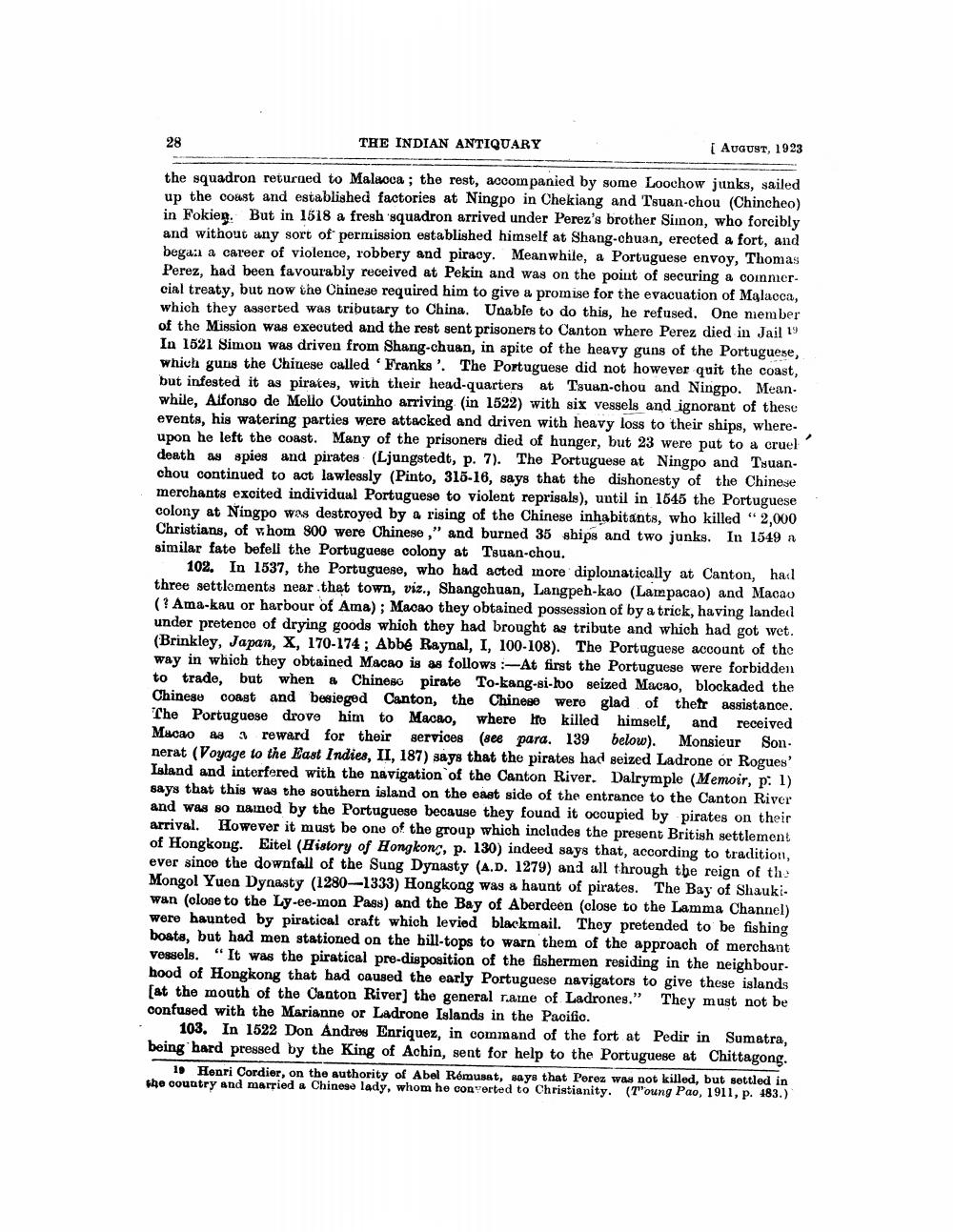________________
28
THE INDIAN ANTIQUARY
[ AUGUST, 1923
the squadron returned to Malacca; the rest, accompanied by some Loochow junks, sailed up the coast and established factories at Ningpo in Chekiang and Tsuan-chou (Chincheo) in Fokien. But in 1518 a fresh squadron arrived under Perez's brother Simon, who forcibly and without any sort of permission established himself at Shang-chuan, erected a fort, and began a career of violence, robbery and piracy. Meanwhile, a Portuguese envoy, Thomas Perez, had been favourably received at Pekin and was on the point of securing a commercial treaty, but now the Chinese required him to give a promise for the evacuation of Malacca, which they asserted was tributary to China. Unable to do this, he refused. One member of the Mission was executed and the rest sent prisoners to Canton where Perez died in Jail 19 In 1521 Simon was driven from Shang-chuan, in spite of the heavy guns of the Portuguese, which guns the Chinese called 'Franks'. The Portuguese did not however quit the coast, but infested it as pirates, with their head-quarters at Tsuan-chou and Ningpo. Meanwhile, Alfonso de Mello Coutinho arriving (in 1522) with six vessels and ignorant of these events, his watering parties were attacked and driven with heavy loss to their ships, whereupon he left the coast. Many of the prisoners died of hunger, but 23 were put to a cruel death as spies and pirates (Ljungstedt, p. 7). The Portuguese at Ningpo and Tsuanchou continued to act lawlessly (Pinto, 315-16, says that the dishonesty of the Chinese merchants excited individual Portuguese to violent reprisals), until in 1545 the Portuguese colony at Ningpo was destroyed by a rising of the Chinese inhabitants, who killed "2,000 Christians, of whom 800 were Chinese," and burned 35 ships and two junks. In 1549 a similar fate befell the Portuguese colony at Tsuan-chou.
102. In 1537, the Portuguese, who had acted more diplomatically at Canton, had three settlements near that town, viz., Shangchuan, Langpeh-kao (Lampacao) and Macao (? Ama-kau or harbour of Ama); Macao they obtained possession of by a trick, having landed under pretence of drying goods which they had brought as tribute and which had got wet. (Brinkley, Japan, X, 170-174; Abbé Raynal, I, 100-108). The Portuguese account of the way in which they obtained Macao is as follows:-At first the Portuguese were forbidden to trade, but when a Chinese pirate To-kang-si-loo seized Macao, blockaded the Chinese coast and besieged Canton, the Chinese were glad of their assistance. The Portuguese drove him to Macao, where he killed himself, and received Macao as a reward for their services (see para. 139 below). Monsieur Sonnerat (Voyage to the East Indies, II, 187) says that the pirates had seized Ladrone or Rogues' Island and interfered with the navigation of the Canton River. Dalrymple (Memoir, p: 1) says that this was the southern island on the east side of the entrance to the Canton River and was so named by the Portuguese because they found it occupied by pirates on their arrival. However it must be one of the group which includes the present British settlement of Hongkong. Eitel (History of Hongkong, p. 130) indeed says that, according to tradition, ever since the downfall of the Sung Dynasty (A.D. 1279) and all through the reign of the Mongol Yuen Dynasty (1280-1333) Hongkong was a haunt of pirates. The Bay of Shaukiwan (close to the Ly-ee-mon Pass) and the Bay of Aberdeen (close to the Lamma Channel) were haunted by piratical craft which levied blackmail. They pretended to be fishing boats, but had men stationed on the hill-tops to warn them of the approach of merchant vessels. "It was the piratical pre-disposition of the fishermen residing in the neighbourhood of Hongkong that had caused the early Portuguese navigators to give these islands [at the mouth of the Canton River] the general rame of Ladrones." They must not be confused with the Marianne or Ladrone Islands in the Pacific.
103. In 1522 Don Andres Enriquez, in command of the fort at Pedir in Sumatra, being hard pressed by the King of Achin, sent for help to the Portuguese at Chittagong.
19 Henri Cordier, on the authority of Abel Rémusat, says that Perez was not killed, but settled in the country and married a Chinese lady, whom he converted to Christianity. (Toung Pao, 1911, p. 483.)




